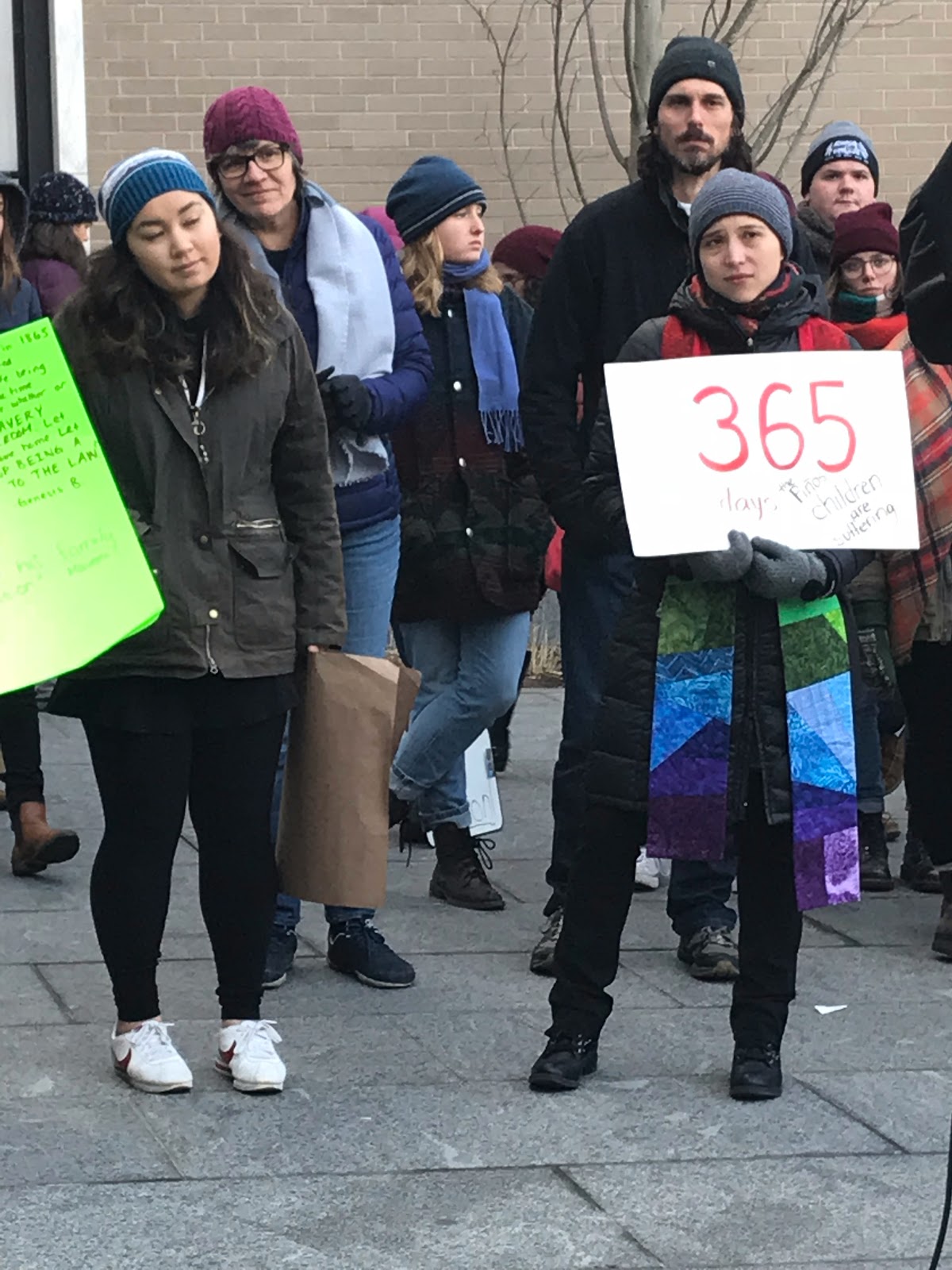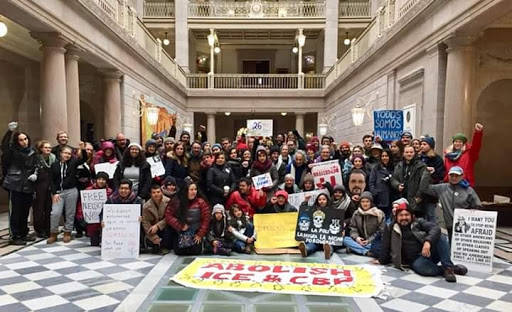
Early last Friday morning, local activists gathered outside the Hartford Immigration and Customs Enforcement (ICE) offices to protest the rejection of Nelson Pinos’ application for asylum.
Pinos took sanctuary in a New Haven church last November to avoid being deported and has been unable to return home to his family in New Haven ever since. To mark the one-year anniversary of Pinos entering the church, protesters occupied the sidewalk and courtyard outside the ICE Federal Building. Their demonstration sought to recognize Pinos’ bravery, show support for him and his family, draw attention to family separations happening in Connecticut, and shut down the ICE office that has refused to grant Pinos a stay.
Ruth Howell, co-chair of the Middlesex Immigrants Rights Alliance (MIRA), commented on how actions like these are necessary to hold ICE accountable to its decisions and to the local community.
“This rally was a community effort to urge ICE to reconsider that decision; to understand that we won’t stop advocating for Nelson and others like him,” Howell said. “ICE has the power to reverse these decisions and owes it to hard-working, tax-paying, loyal members of our communities, like Nelson and his family. ICE needs to understand that large numbers of people will continue to draw attention to their inhumane decisions and resist in any way possible.”
Born in Ecuador, Pinos immigrated to Connecticut in 1992. During his time in the United States, Pinos made diligent efforts to check in with INS and ICE have his work permits approved, and was consistently told he was not a high priority for deportation with his spotless criminal record. During a routine check-in by Homeland Security in October of 2017, Pinos was told to return to Ecuador, a country he has not set foot in for 26 years. Unable and unwilling to leave his partner and three children, Pinos sought refuge in the First and Summerfield United Methodist church in New Haven, where he has been living in sanctuary ever since. Two weeks ago, ICE denied Pinos a “stay of removal,” which would have allowed him to return home to his family while awaiting the decision on his deportation case. Without their father, Nelson’s children have struggled with their mental health and school work.
With a turnout of close to 100 people, the rally shut down a major portion of Main Street for much of the morning. Several protesters chained themselves to concrete barrels and to each other in order to create an impassable human blockade to inhibit ICE employees from entering the building. Ava Biery ’19, a student activist who participated in the rally, wrote to The Argus to explain the significance of this direct action.
“The purpose of the barrels and the chains was to create a barrier that would be very hard for the police to disrupt,” Biery wrote. “People who were sitting and chained together couldn’t simply be pushed out and arrested. Further, the chaining is a form of escalation, which is necessary as Nelson has been in sanctuary for an entire year and his most recent request for a stay of removal has been denied, even though ICE would be entirely able to grant him that stay as they’ve done for him in the past. Among those chained were Pinos’ two daughters: Kelly, who is 16, and Arlly who is 13.”
Beyond direct action participants, groups like MIRA, Shoreline Indivisible CT, and Unidad Latina en Acción as well as local religious groups came out to demand the reversal of Hartford ICE Director Aldean Beamont’s decision on Nelson’s stay of removal. A host of colorful protest signs, chants, a brass band, and poetry readings kept the rally lively, while dancing and hot coffee kept the protesters warm in the 26-degree weather.
Though the crowd began to dwindle later in the morning, Biery commented that spirits remained high and that by 9:30 a.m., protesters were successful in shutting down the building. At 10:30 a.m., the remaining protesters supported those who participated in the direct action in removing their chains, and the group marched to Hartford City Hall, chanting “Keep Nelson home.” After a few rousing speeches from the event organizers, protesters marched out of the building chanting “We’ll be back” before dispersing.

Though no arrests were made, the Hartford Police presence was felt at the rally, and rumors circulated that the Federal Police were also on site. The rumors, however, later proved to be nothing more than a scare tactic. According to Biery, the lack of arrests were likely a result of the negative media attention that arrests at recent anti-deportation protests in Connecticut have received. The Hartford Police Department neglected to comment.
Though the direct action was successful in closing the office, ICE has yet to reverse the decision on Pinos’ stay. For members of the University community who missed the rally but are invested in Pinos’ case, Howell reflected on ways students can get involved in the future.
“For Nelson in particular, financial contributions are badly needed,” Howell said. “His family continues to live without any income except for contributions from supporters…There’s a go-fund-me campaign that students can access both on the Unidad Latina en Acción (ULA) and Shoreline Indivisible Facebook pages…. For issues related to undocumented immigrants in general, [the community is] welcome to work with MIRA or ULA on all the activities that are needed on a regular basis—accompaniment to ICE appointments, writing letters of support or articles for the local media, posting actions on their Facebook pages.”
The University students who were in attendance found out about this rally through emails circulating the MIRA and ULA email lists, as the rally organizers were careful to keep the details off social media for fear of the event being shut down. Beyond the rally, students and faculty alike have been involved in accompanying undocumented people to their ICE check-ins. Biery encouraged students to become even more active rally participants and to educate themselves on the responsibilities associated with these roles.
“Get in touch with local organizers, get trained in being a protest marshal, a police liaison, go through street medic training—it’s tough work but those roles are all crucial to effective direct action,” Biery wrote. “If you inhabit a position of privilege and are less at risk for police brutality, you absolutely can and should participate in direct actions: but always ensure that you attend all preliminary meetings, listen to organizers, and be aware of your role and how your actions affect the group. It’s about more than just showing up.”
Hartford ICE Supervisor Aldean Beaumont can be reached at 860-240-3012. You can leave a message demanding the reversal of his decision on Nelson’s stay of removal.
Alexandra Gomberoff can be reached at agomberoff@wesleyan.edu.


Leave a Reply